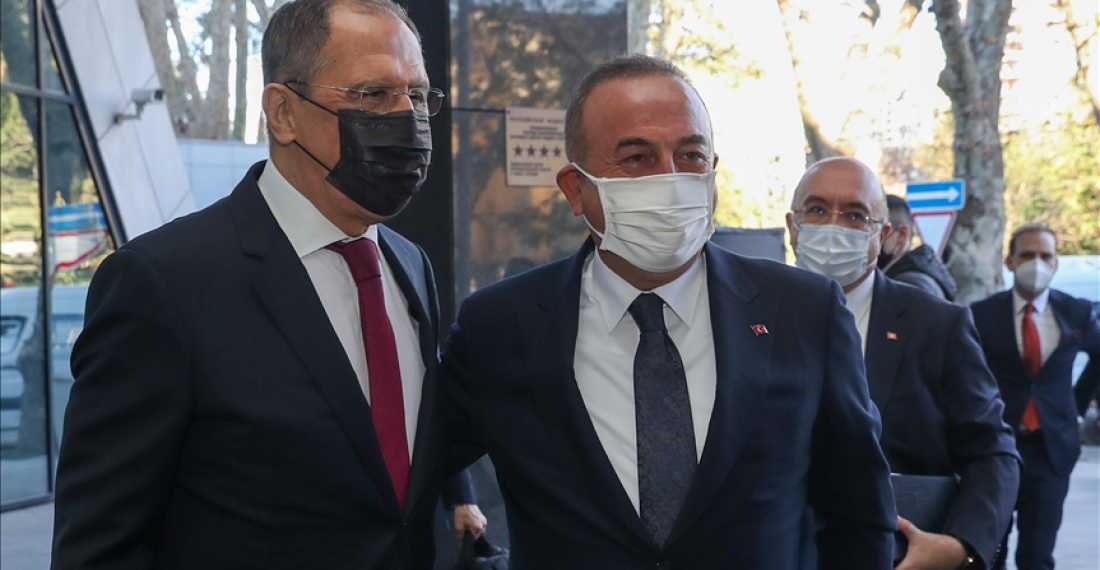Turkey and Russia will do their best for sustainable peace in the region of Nagorno-Karabakh, Turkish Foreign Minister Mevlut Cavusoglu said Tuesday (29 December) at a joint press conference with his Russian counterpart, Sergei Lavrov, in the Russian Black Sea city of Sochi.
Cavusoglu said: “Turkey-Russia joint center in the region will soon be active. We will also intensify efforts to normalize ties with Armenia.”
Both ministers said they paid priority to the Nagorno-Karabakh settlement while discussing the international agenda.
"We welcome Ankara's desire to help the parties to the conflict fulfill their obligations. In particular, within the framework of the agreement signed by the presidents of Russia, Azerbaijan, and the prime minister of Armenia on November 9, as well as within the framework of the Russian-Turkish joint center for monitoring the implementation of cease-fire obligations," Lavrov said.
Cavusoglu also referred to recent U.S. sanctions on Turkey, describing them as illegitimate and against the country’s sovereign rights. He added, “We may have our differences with Russia. We don’t have to have the same opinion on everything. Our ties with Russia are not an alternative to our ties with NATO or the EU. The West should focus on cooperating with us, rather than imposing sanctions.”
Lavrov, for his part, said Moscow and Ankara's military cooperation would not be deterred by the United States imposing sanctions on Turkey earlier this month for acquiring a Russian missile defense system.
"We have confirmed our mutual intention to develop military ties with Turkey" despite "Washington's illegitimate pressure," Lavrov said.
Regarding the Libyan crisis, Cavusoglu said Turkey’s support for the Libyan government balanced the situation on the ground and showed the war was a stalemate. The warring sides have now joined an ongoing political process, he added.
Cavusoglu said no country or person, including Haftar, has the right to ask Turkey to leave Libya. "We have legitimate reasons to be there," he said. Cavusoglu stressed that Turkey does not seek profit in Libya, but assists in the achievement of national unity and establishment of dialogue between parties. He also stressed that the global community has to take a more active role in encouraging the Libyan parties to peace.
Lavrov also said they are in touch with all the parties in Libya, and Turkey and Russia provide all kinds of support for a political solution in Libya.
They also reaffirmed the commitment to the work in the Astana format, as it has proven its effectiveness and ability to resolve the most pressing issues related to the situation on the ground.
"We talked about how to implement the agreements of our presidents on the Idlib de-escalation zone. These tasks are being carried out, we would like it to happen faster," Lavrov said.
Cavusoglu also appreciated Russian efforts to curb attacks by the Syrian regime, saying: “They have made a recognizable difference in the war-torn country.”
The meeting in Sochi came ahead of a planned meeting of the High-Level Russian-Turkish Cooperation Council, set to be co-chaired by their presidents. Earlier, Lavrov stressed that despite the coronavirus pandemic, President Recep Tayyip Erdogan and his Russian counterpart Vladimir Putin remain in close contact. This year they met in person three times, took part in a videoconference in the Astana format and conducted nearly two dozen phone conversations.
"This statistic alone shows what a rich agenda fills our relations," Lavrov said.
He added that apart from preparing for the presidential meeting, he would like to discuss the state of affairs in the Black Sea, Middle East and the Caucasus regions.
"We have a rich international agenda, the Syrian settlement, Libya, other parts of the Middle East region and Nagorno-Karabakh topic that recently came forward," Lavrov said.
"We greatly value our trustful dialogue," he added.
For his part, Cavusoglu stressed that the close dialogue between the Turkish and Russian presidents, and the mutual trust between them, serves not only the development of bilateral relations but also regional ties.
Cavusoglu said he regretted that the pandemic kept the two countries from a full-fledged celebration of the 100th anniversary of their bilateral relations but added he was satisfied to end the year with a personal meeting.






